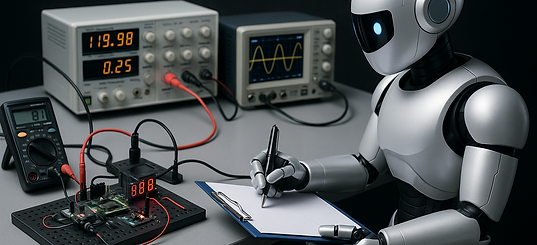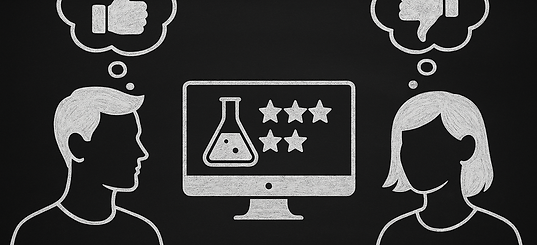Laboratory Research
The teaching laboratory is poised to grow in importance as education shifts toward learning experiences that emphasise distinctly human capabilities—skills that Generative AI cannot yet replicate. These studies contribute to advancing our understanding of learning objectives, assessment practices, student evaluation, training, and quality assurance in this evolving context.
Laboratory Learning & Assessment
These studies explore learning priorities, assessment practices and how learning impacts the student experience.
Assessment integrity and validity in the teaching laboratory: adapting to GenAI by developing an understanding of the verifiable learning objectives behind laboratory assessment selection
This study provides an overview of assessment methods used in teaching laboratories and examines their validity for learning across the cognitive, psychomotor, and affective domains. As education increasingly emphasises human competencies, particularly in the psychomotor and affective domains, this study highlights the key validity challenges that must be addressed to ensure meaningful and equitable assessment.

Remote, simulation or traditional engineering teaching laboratory: a systematic literature review of assessment implementations to measure student achievement or learning
This paper undertakes a systematic literature review exploring remote, simulation and traditional laboratory studies that explicitly include assessment analysis. Explored are the types of assessments used and assessment innovations. The study 1) confirms that assessments concentrate on the cognitive domain, underselling the learning being achieved; 2) Student survey instruments play an important role in measuring laboratory success; 3) Background information of the learning objectives are not clearly stated and/or not clearly linked to the associated assessment; 4) There are several research opportunities available to improve understanding of laboratory assessments.

Laboratory learning objectives: ranking objectives across the cognitive, psychomotor and affective domains within engineering
This paper ranks the laboratory learning objectives across the cognitive, psychomotor and affective domains to improve scaffolding. It provides an opportunity for reflection, a pathway to confirm assessment alignment, and opens future research areas.

A ranking comparison of the traditional, online and mixed laboratory mode learning objectives in engineering: Uncovering different priorities
This study explores whether academics implementing laboratories across different modes think about learning objectives differently. The findings show that those implementing traditional and mixed laboratories align closely in their ranking choices, while those implementing online-only laboratories think about the objectives slightly differently. These findings provide an opportunity for reflection, enabling engineering educators to refine the alignment of their teaching modes, implementations and assessments with their intended learning objectives.

Autonomous Assessment of a Laboratory Exam for the Digital Hardware Curriculum
practical skills and the psychomotor domain are largely underexamined in tertiary engineering education, in favor of theoretical tasks. Laboratory exams, as they exist today, lack the scalability of written exams and standalone single-student exam boards require technical supervision beyond the understanding of an exam invigilator. Such logistical and technical bottlenecks could be overcome through a portable electronic device that contained autonomous assessment capability. This paper explores the prototyping of a self-contained assessment module, capable of accurately assessing a student's psychomotor capability within a university Digital Hardware course.

Student Evaluation of Laboratory Experiences
These studies explore relationships that potentially shape the way in which students evaluate their laboratory experiences.
Laboratory learning objectives measurement: Relationships between student evaluation scores and perceived learning
Debate continues on the capability and/or reliability of students to evaluate teaching and/or learning. Understanding such relationships can help educators decode evaluation data to develop more effective teaching experiences. This article provides evidence that perceived learning has a relationship and influences the way students evaluate laboratory experiments, facilities, and demonstrators.

Gender relationships with student experience in the engineering teaching laboratory: A multi-learning domain gender correlation between student evaluation scores and perceived learning
Student evaluation data has been recognised for a very long time as being beneficial if used correctly and very dangerous if applied without understanding. With males being the largest proportion of students in engineering classrooms in many countries, do the voices of female students get drowned out, leading to feedback cycles tailoring better learning experiences for males? The study finds that the evaluation relationships for males and females differ, and the implications are discussed.

Decoding Student Satisfaction: How to Manage and Improve the Laboratory Experience
This study explores the implementation of a laboratory quality management process. It investigates the reforms that were implemented and outlines a number of the improvements made. It also examines the program's overall impact on: (1) overall satisfaction; (2) laboratory notes; (3) learning experiences; (4) computer facilities; (5) engineering equipment; and (6) condition of the laboratory.

Laboratory Teaching & Quality Processes
These studies explore the impact of laboratory demonstrators on the student experience, and how quality processes can be put in place. They also explore what makes a quality laboratory experience.
Maximising resource allocation in the teaching laboratory: understanding student evaluations of teaching assistants in a team-based teaching format
This study explores the relationship between laboratory demonstrator evaluation scores and student evaluations of the laboratory experience. The study quantifies the influence the demonstrator has on the laboratory experience, highlighting the need for formal training processes.

